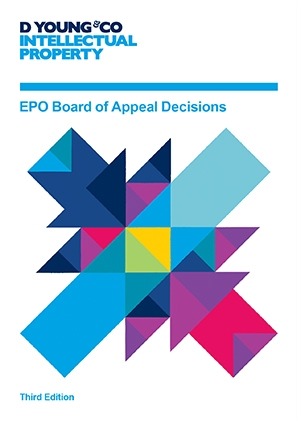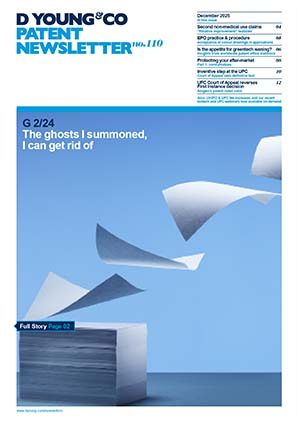Accelerated processing before the EPO Boards of Appeal
Appeal proceedings at the European Patent Office (EPO) typically last in excess of three years, but can last significantly longer (according to the 2017 Annual Report of the Boards of Appeal, technical appeal proceedings lasted 38 months on average, but some cases had been pending for eight years). With this long duration of proceedings, it is no surprise that there is a substantial backlog of pending cases (over 9,000 at the end of 2018, according to the 2018 Annual Report of the Boards of Appeal).
Often appeal proceedings concern matters of great commercial importance to, for example, applicants/proprietors looking to work, license or enforce a patent, and opponents looking to clear the way to work an alleged invention. Therefore, this long duration of proceedings can be problematic for applicants/proprietors and opponents. Moreover, in a number of EPC states, national nullity/infringement proceedings are often stayed pending an EPO final decision.
To address these issues, the EPO provides for accelerated appeal proceedings under certain circumstances, based on the “Notice from the Vice-President Directorate-General 3” on 17 March 2008 (OJ EPO 2008, 220; "the notice”). Specifically, parties with a "legitimate interest” may request that an appeal is prioritised and accelerated.
Requests for accelerated processing of an appeal should be filed with the competent Board of Appeal, and may be filed at the beginning of or during appeal proceedings. Such requests should specify the reasons for urgency, and be submitted with documents that support this reasoning. There is no official form for requesting accelerated processing of an appeal.
Legitimate Interest
Exactly what constitutes a legitimate interest is not entirely clear from the notice, although some specific examples of circumstances that could justify accelerated processing are provided:
- Where infringement proceedings have been brought or are envisaged;
- Where the decision of potential licensees of the patent under appeal hinges upon the outcome of the appeal proceedings; and
- Where an opposition that was granted accelerated processing has been made the subject of an appeal.
While the latter of these circumstances is straightforward, the other two leave some room for interpretation, and thus allow the relevant Board of Appeal significant scope when deciding whether the requestor has a legitimate interest or not. Indeed, according to established case law of the Boards of Appeal, the granting of accelerated processing is always at the Board’s discretion, and there is no fixed standard of proof (see CLBA 8th Edition, IV.E.1.3, particularly T 895/13, which is supported by numerous cases including T 1125/13 and T 239/16). We will discuss how the example reasons for accelerated processing have been applied in practice by the Boards of Appeal below.
If the EPO becomes aware of national infringement proceedings pending in relation to the European patent, it will accelerate processing of the opposition (based on the Notice from the EPO on 17 March 2008 (OJ EPO 2008, 221)). A party to the opposition proceedings may request accelerated processing under these circumstances. The request may be filed at any time, but must be filed in writing.
Following such a request, the EPO will endeavour to issue the next procedural action within three months of the request, or within three months of the patent proprietor’s response to the notice of opposition, as appropriate.
What counts as infringement proceedings?
The circumstances for accelerated processing for an appeal are broader than those for a pending opposition, which are limited to when infringement proceedings are pending in relation to the European patent before national courts of a contracting state. The corresponding definition for appeals appears to suggest that any proceedings, in any jurisdiction, could give a party a legitimate interest, depending on the judgment of the Board of Appeal.
Infringement proceedings brought in national courts of an EPC contracting state and relating to the same patent under appeal generally lead to accelerated processing being granted. This can also be requested by the national courts themselves.
However, accelerated processing has also been granted under circumstances that do not fall in this category, for example:
- In T 1868/16, proceedings were accelerated due to arbitration proceedings being brought in Portugal against an affiliate company of an opponent. Since this arbitration is mandatory in Portugal, it was considered by the Board of Appeal in this case to represent de facto infringement proceedings.
- In T 1009/14, a request for accelerated proceedings by the appellant was granted due to its filing of several complaints for patent infringement in the USA based on a US patent that claimed priority from the application under appeal.
- In T 239/16 and T 1677/11, accelerated proceedings were granted based on infringement proceedings being brought against a parent (T 239/16) or a sibling (T 1677/11) patent of the patent under appeal. Notably, in T 239/16 a stay of proceedings had been requested in the French courts awaiting the decision of the appeal, which may have influenced the decision of the Board of Appeal. Moreover, in T 1677/11 the sibling patent was the subject of litigation in several countries and another appeal at the EPO where acceleration had been requested and the issues were closely related, which may also have influenced the decision of the Board of Appeal.
It is clear from the above cases that there is precedent for accelerated processing being granted in cases where the infringement proceedings have not been brought in an EPC contracting state, and where the infringement proceedings relate to a different, although closely related, patent to that under appeal at the EPO.
What is required for infringement proceedings to be “envisaged”?
The notice also provides for proceedings to be accelerated if infringement proceedings are not yet brought, but are envisaged.
Where requests for accelerated proceedings have been granted, the party requesting acceleration has typically provided evidence, or otherwise asserted, that there is a product on the market that appears to infringe the claims of the patent/application (based on, for example, T 248/17, T 1948/13, T 644/10, and T 1541/10).
Potential licensees
The second example of circumstances in which accelerated processing may be granted is where the decision of potential licensees hinges on the outcome of an appeal.
Accelerated processing has often been granted on this basis, and nearly always without proof being required, as licensing negotiations are inherently confidential (based on, for example, T 690/13, T 109/15, T 1987/10, T 644/10, T 585/08 and T 342/07).
However, T 872/13 states that requests for accelerated processing on these grounds must be filed by the patent proprietor, not an opponent who may also be a potential licensee.
Other reasons for acceleration
Infringement proceedings and licensing are only example reasons why accelerated processing may be granted, although in practice the Boards of Appeal have usually based their decision on whether the reasoning matches the example reasoning of the notice.
There are, however, cases where Boards of Appeal have decided to grant accelerated processing for other reasons, for example:
- National courts may grant preliminary injunctions despite revocation at first instance: For example, in T 1125/13, accelerated processing was granted because the Belgian courts were likely to grant a preliminary injunction (possibly ex parte) even though the patent was revoked at first instance, and the patent proprietor had previously sought preliminary injunctions in such instances;
- Limited patent term remaining and/or the EPO was responsible for long delays in prosecution or opposition proceedings: For example, in T 936/11, accelerated processing was granted because only four years remained of the full patent term, and because of the protracted length of the first instance proceedings (similar to T 40/13 and T 370/13). In T 2495/11, accelerated processing was granted due to prolonged search and examination. However, in T 845/12, accelerated processing was not granted despite limited patent term remaining. It appears that accelerated processing is more likely to be granted if the EPO was responsible for long delays in prosecution or opposition proceedings; and
- Phase III clinical trials: For example, in T 1502/10, accelerated processing was granted because a product of the patent proprietor that fell within the scope of the patent claims was entering phase III clinical trials.
Arguments that have been rejected
As might be expected, it has often been argued that accelerated processing should be granted due to the appeal process “causing uncertainty”, “hampering investment”, or being of “commercial importance”. These arguments have been rejected almost exclusively.
Similarly, arguments that the case raises legal issues of fundamental importance have usually been rejected. However, according to established case law of the Boards of Appeal, accelerated processing may be granted despite such reasoning if there is agreement between the parties, and early resolution of the dispute is in the public’s interest (see CLBA 8th Edition, IV.E.1.3, particularly T 734/12).
Importantly, accelerated processing has also been rejected when requested by a strawman that argued the real party behind the appeal had a legitimate interest, because the strawman itself did not have a legitimate interest (based on T 872/13).
Future developments
The Rules of Procedure of the Boards of Appeal (RPBA) have recently been revised and approved by the Administrative Council.
The Rules of Procedure of the Boards of Appeal (RPBA)
The new rules will enter into force from 01 January 2020, and can be viewed on the EPO website along with explanatory remarks:
Read moreRevised Article 10 paragraphs (3) to (6) now explicitly incorporate the possibility for acceleration of appeal proceedings. These provisions are intended to replace the notice in OJ EPO 2008, 220.
The explanatory remarks specifically state that the party requesting acceleration will no longer need to show a legitimate interest.
What the ramifications of this will be is not clear, although this may allow parties to validly request acceleration for reasons (such as infringement proceedings) that do not directly concern them. Otherwise, the accepted conditions for accelerated processing are unlikely to alter drastically. We will keep you informed of developments in this matter.
If you are interested in requesting accelerated processing of opposition or appeal proceedings, or have any questions in respect of the above, please do not hesitate to contact a member of our patent team.
Related article
"European Patent Office - Revised Rules of Procedure of the Boards of Appeal", Catherine Keetch, 08 July 2019.
Read more


